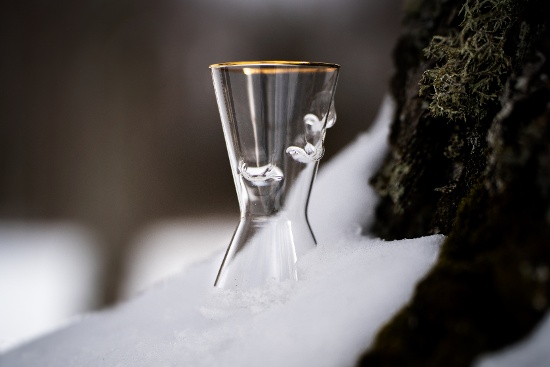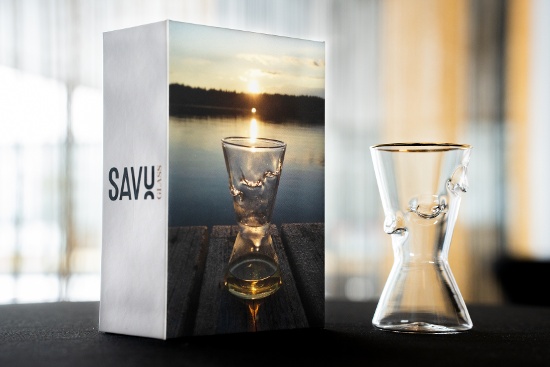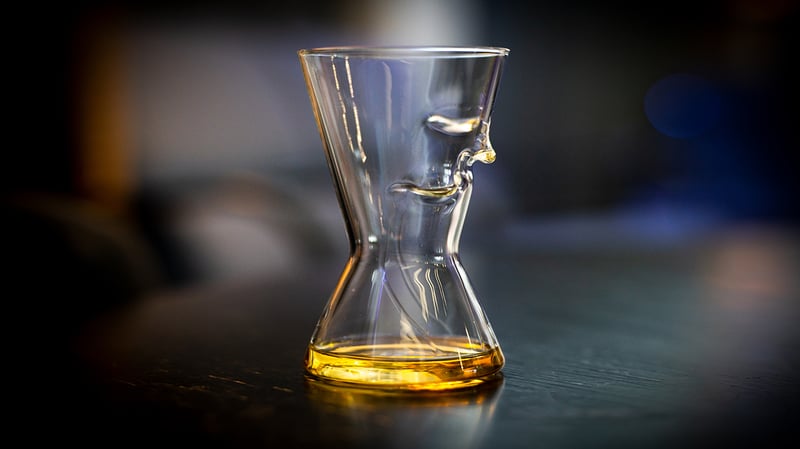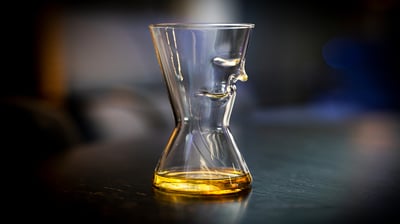Noble Glass Ltd is a Finnish startup company founded in 2020 that designs, manufactures, and markets special drinking glasses. Currently on the market is the first Noble Glass product, SAVU whisky glass, which brings out the aromas of whisky in a completely new way. SAVU glass has been patented in Europe, the US, Japan, and China and the company is now looking for growth in the international market.
Jari Tuominen is an expert in aromas and scents. A chemist with a long career at VTT, he has done a lot of research for example on how our sense of smell receives different kinds of aroma molecules and what happens in our brain when we sense a smell. The sense of smell is also closely related to the sense of taste, and we are not able to accurately distinguish taste without the cooperation of the two senses.
 Jari Tuominen, CEO Noble Glass Ltd
Jari Tuominen, CEO Noble Glass Ltd
The nose can only analyse two things about a mixture at a time. After that it takes a minute until the binding sites of the aroma molecule are released and new molecules can bind to them, Tuominen explains.
As a wine and whisky enthusiast, Tuominen has got acquainted with how the aroma molecules of wine and whisky work. In fact, one concrete example of the importance of the connection between the senses of smell and taste becomes apparent in a wine or whisky tasting: the best aroma experience requires both senses.
I got to know people interested in wine back in the day and they asked me to arrange wine tastings based on my knowledge. That way, I also got to know people interested in whisky, Tuominen reminisces.
Ethanol disguises other aromas
Tuominen and his friends have run their own wine club for over 20 years already. Over the years he has arranged several tastings. Whisky tastings made him soon realise that whisky’s high ethanol content made discerning and distinguishing different aromas challenging.
Both whisky and wine are made in a certain way especially because that way the desired aroma molecules can develop. Otherwise, whisky would be like vodka. However, ethanol is by nature a substance that prevents us from getting to the source of aroma. It forms, as it were, a curtain behind which one should get. I realised something must be done about it, Tuominen emphasizes.
Distillery in a glass
Tuominen began to design a completely new kind of whisky glass with like a small distillery inside. The purpose of the distillery is to evaporate the pungent smell of ethanol and bring forward the other aromas of whisky. Both University of Helsinki and University of Turku as well as several doctors and neuroscientists have been involved in the development work.
In 2020, a new company called Noble Glass was established to manufacture and market the glass. The first glasses were put on the Finnish market a couple of years ago. The glass was given the name Savu, which means smoke.
We currently have an operational team of four people who take this thing forward. Two chemists, one expert in logistics and international trade, and an expert in social media, Tuominen sums up.
From an idea to a novel invention
When the development process continued, Tuominen and his partners discovered that their idea was starting to fulfil the criteria for a novel invention. Although there are plenty of different kinds of whisky glasses on the market, the functionality they had developed for theirs was unique. None of the other glass manufacturers had anything similar.
When it started to look like we are about to make an invention, we reached out to Berggren and Timo Pitkänen. He was immediately interested in the idea, Tuominen says.
The aim was to apply for broad protection for the invention. Now, the Savu glass has a patent in Europe, the US, Japan, and China. What’s more, Noble Glass also has two EU trademarks.

The prosecution of the patent applications with rounds of amendments in each region and country took a long time and was occasionally rather challenging. Berggren and Noble Glass have therefore worked closely together over the years.
Essentially, I wrote out the initial content of the applications and Berggren then helped by amending them to meet the formal and legal requirements of a patent application. After that, each application was filed in the selected country and we started waiting for an answer as to whether the application would be allowed or whether further amendments were needed, Tuominen summarizes.
The processes were more complex than I had anticipated. So, these things are not easy breezy. However, we have achieved quite a lot and know that the product is good, Tuominen describes.
Granted patents help international trade
Now that the patent applications have been granted patents in the key market areas, Noble Glass has been able to begin international sales. Next, they intend to pursue the market in Germany, the US, and Japan. The goal is to collaborate with a distillery or a store chain, for example.

I visited Japan myself to market the glass. They liked it, but Japan is a difficult country. Making decisions takes time and the process can take up to three to five years. At the same time, it is a country where the process would stop immediately if the product did not have a patent. Vendors must be given facts. You must not lose face and you must know the people you a doing business with. Trust must be earned, Tuominen states.
In the US we use a consultant with good contacts. We are trying to sell our glass to the Las Vegas casinos. In Germany, on the other hand, we are looking for suitable channels to initiate sales, he continues.
Comprehensive preparation makes the process quicker and easier
Although the patenting process was time-consuming and demanding, Tuominen is pleased that it was successful. He encourages other inventors and entrepreneurs in the early stages of the patenting process to prepare for it as well as possible in advance.
The patenting process is not one of error and trial. It will be a long one if there are lots of open questions. It is therefore worthwhile to clarify especially to oneself what it is you are patenting and why. Also, you really cannot draft a patent application yourself but need professional help just because they know how the process works. What’s more, they can help you with the patent lingo and its expressions, Tuominen continues.
Cooperation with Berggren went well and was businesslike. Timo Pitkänen as a professional was a good match for us and knew what it was all about. I am very pleased that we applied for and were granted the patents. It is great to be able to say you have done something in this world no-one else ever has, Tuominen sums up.

Our client experience story has been independently produced by Kokemuksia.fi. Each story has been approved by the interviewed client, and the company featured has had no opportunity to influence the content of the story.

